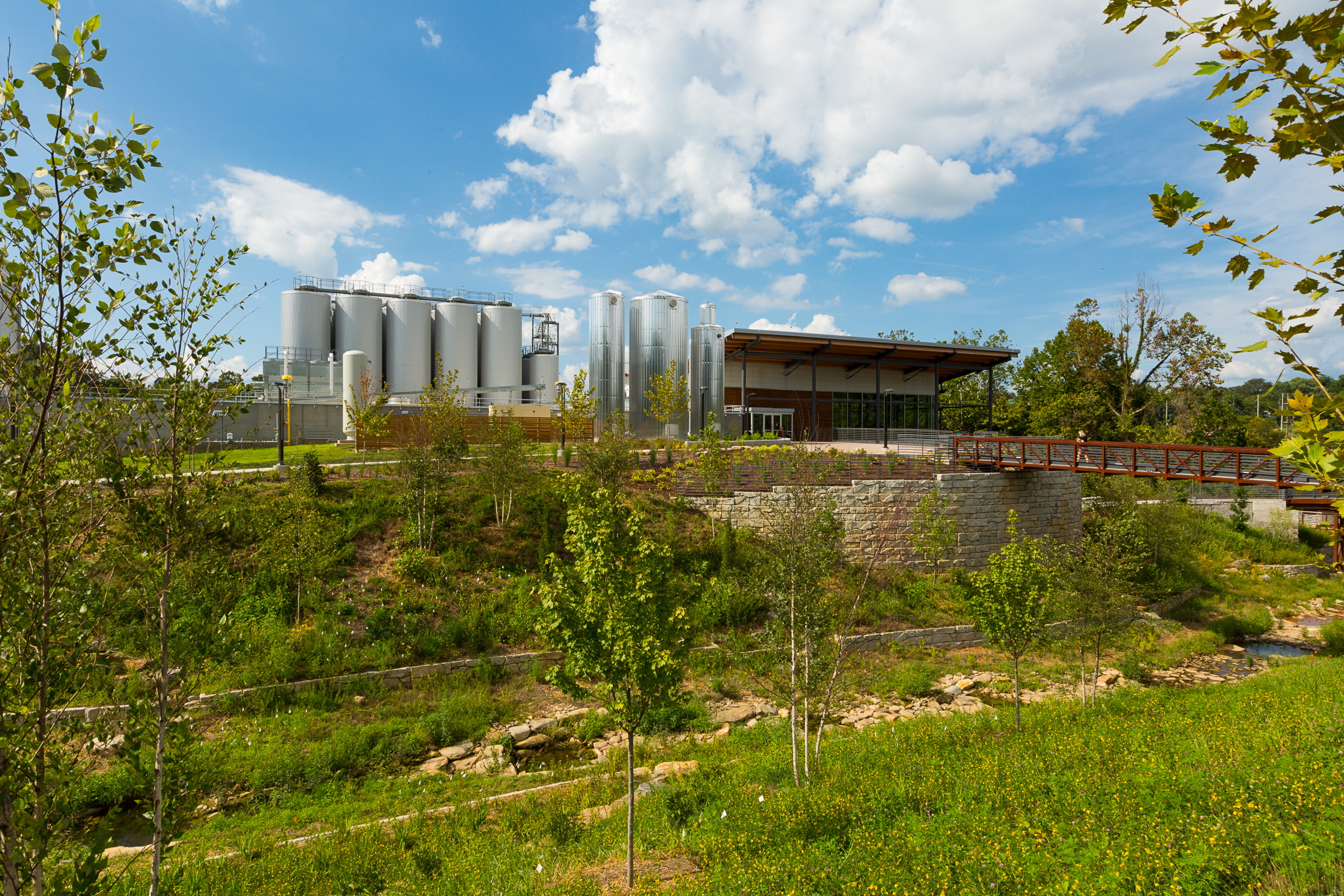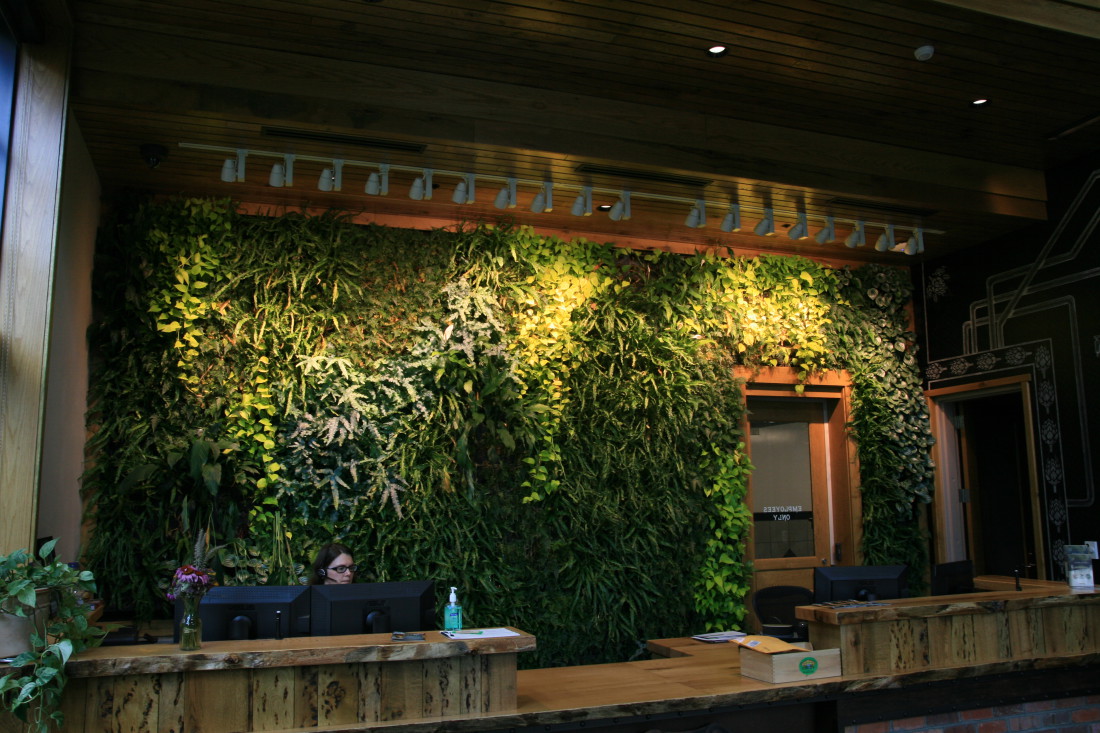Craft brewing is a business driven by a strong sense of place, and industry people tend to be passionate about their communities. Environmental sustainability is a high priority for craft breweries of every scale, and as Asheville’s prominence as an East Coast brewing hub continues to grow, regional breweries’ efforts to protect their environment have similarly expanded in scope.
From restoring old buildings for use as production facilities to repurposing spent grain and yeast as livestock feed, every step in the brewing process provides opportunities for reducing environmental impacts, and Asheville is home to some of the most environmentally responsible breweries in the industry. While these stewardship efforts are predominantly altruistic, they also make good business sense, says Cheri Chastain, sustainability manager at Sierra Nevada Brewing Co.
“Quality will always come first, but sustainability is part of our DNA, so it’s just a natural part of our operations,” Chastain says. “Sustainability is all about balancing the environmental, social and economic impacts of all decisions, and this is something I think Sierra Nevada does incredibly well. It’s hard to attach a dollar figure to environmental and socially beneficial projects, but we know that these things are important if we are to survive as a company, so we give them serious consideration.”
A good business case
Chastain, who co-chairs the Brewers Association’s sustainability subcommittee, was instrumental in Sierra Nevada’s obtaining LEED Platinum certification — the U.S. Green Building Council’s highest standard for environmental responsibility in design, construction methods and ecologically sustainable practices — for the Mills River production facility. Subcommittee co-chair Katie Wallace shares those sentiments.
“Environmental sustainability has been a focus of ours since before we poured our first beer,” says Wallace, New Belgium’s assistant director of sustainability. Over the course of a couple of decades, she explains, “We learned that this is good for business: We feel like we are more profitable because of our sustainability efforts. So we know that there’s a good business case for it, and besides, it’s just the right thing to do.”
The two women played a critical role in executing an exhaustive survey that assessed the environmental impact and stewardship practices of nearly 80 breweries across the country. Besides collating data on participants’ consumption of fuel, electricity, water and carbon dioxide, the study analyzed wastewater effluent, greenhouse gas emissions, solid-waste disposal and recycling practices. The idea was to enable craft breweries of all sizes to compare their sustainability behaviors with industry norms to help them manage growth while making environmental best practices a top priority.

New Belgium’s decision to build a production facility in Asheville rather than expanding its Fort Collins, Colo., brewery saves the company roughly 2 million distribution miles per year, substantially reducing carbon emissions. Similar concerns prompted Sierra Nevada and Oskar Blues to develop East Coast facilities in the Asheville area.
New Belgium’s sustainability team is based in Colorado, but in 2017, Sarah Fraser will become the Asheville facility’s sustainability specialist. Fraser, who has a bachelor’s degree in biology from Appalachian State University and a master’s in environmental studies from the College of Charleston, currently works at the Asheville brewery in another capacity; she’ll transition into her new role next spring after her first child is born.
Waterworks
Environmental factors, including the region’s outstanding water quality, also figured into these breweries’ decisions to locate facilities here. But the water used for brewing wasn’t their only concern. Sierra Nevada, for example, built a complex network of cisterns and water collection mechanisms throughout its property that gradually release rainwater back into the river system to avoid excessive erosion.
New Belgium’s West Asheville property, formerly the home of the WNC Livestock Market, was a brownfield site that the brewery remediated. The site had been used as a dump for many years, and Penland Creek, which runs through it, had been forced underground. The city, which retains ownership of the waterway, partnered with New Belgium, Equinox Environmental and others to restore it.
For many other local breweries, repurposing existing structures to house their brewing operations is a way to reduce the environmental impact of their growth. Fonta Flora in Morganton is renovating historic structures on an 8-acre former dairy farm as it develops a second location.
Burial Beer Co.’s restoration of the Civilian Conservation Corps barracks off London Road in Biltmore Village is nearly complete. And Wedge Brewing Co. continues to grow into the former Hans Rees Tannery in the River Arts District.
Waste not
Even buildings that can’t be restored can be repurposed, however, and sustainable construction practices can substantially reduce waste.
With the help of The Old Town Salvage Co., New Belgium was able to reuse much of the material from the structures dismantled to make way for the new brewery. In addition, 97 percent of its construction waste was diverted from the landfill. Sierra Nevada, meanwhile, was able to keep 88 percent of its construction waste out of the landfill, which contributed to that facility’s LEED platinum certification. Fonta Flora, too, is reusing materials in the painstaking restoration of its expansion site.
Asheville’s oldest brewery, Highland Brewing Co., took a similar approach when it moved to its current East Asheville location in 2006. The existing building, which was in an advanced state of disrepair, had previously served as a ball bearing factory, a textile manufacturing facility and a movie studio. By renovating it, Highland was able to preserve the surrounding green space. The brewery also used steel and cinder blocks from demolished on-site structures when building the adjacent event space. Concrete from the recently renovated packaging area was used as subgrade for a new parking area behind the brewery and retaining walls around the event center’s entrance.
Electric beer
Brewing is energy-intensive, and breweries large and small have turned to solar power to reduce their reliance on fossil fuels. In 2015, the Sylva-based Innovation Brewing installed a 100-panel solar array that’s capable of generating 28.5 kilowatts of electricity. “We would have installed more, but we ran out of space to put them on our roof,” notes co-owner/brewer Chip Owen. Innovation also heavily insulated its brewhouse with spray foam to reduce the amount of energy needed for heating and cooling.
Both Highland and Sierra Nevada, meanwhile, are industry leaders in clean energy production. Highland’s 1,045 solar panels — the third-largest solar array of any craft brewery in the country and 13th-largest of any brewery in the world — produce 324 kW of electricity, says marketing coordinator Molly McQuillan. And Sierra Nevada’s 2,200 panels produce roughly 600 kW, augmented by another 400 kW generated by using methane harvested from its wastewater treatment plant.
Many local breweries are finding creative ways to reduce their consumption of key resources. New Belgium, for example, employs a medium-temperature brew kettle that uses pressure rather than steam to boil the wort. This energy-efficient device, says Wallace, is the only one of its kind in the U.S. Glycol draws off heat to chill the wort, and the hot glycol is then used to vaporize liquid CO2 for use in the brewing process. Others, including Highland and Innovation, recapture cooling water for use in cleaning or brewing.
Raising the bar
But once the more obvious best practices have been implemented, meeting these companies’ lofty sustainability goals for the future becomes increasingly difficult. Highland plans to catch rainwater from its roof for bathrooms and washing operations, and to repurpose hot wastewater to heat its offices and production area. New Belgium aims to make its facility carbon-neutral by the year 2100, and Sierra Nevada has pages of future plans designed to optimize its processes.
“The environment should be important to everyone,” says Owen of Innovation Brewing. “We’re altering the climate, affecting the growing conditions of the very ingredients we put into our beer. And that’s just the small scale. Global climate change is affecting our entire planet, and we’re trying to do our part to not leave such a mess for future generations to clean up. We’ll continue to pursue sustainability in regard to every aspect of our lives.”
Chastain agrees. “Things like droughts and late rains impact the cost of hops and barley and, thus, our operating expenses. Water is the other major ingredient that can drastically change with our environment. If we don’t have abundant, quality water, we don’t have beer.”



“New Belgium’s decision to build a production facility in Asheville rather than expanding its Fort Collins, Colo., brewery saves the company roughly 2 million distribution miles per year, substantially reducing carbon emissions. Similar concerns prompted Sierra Nevada and Oskar Blues to develop East Coast facilities in the Asheville area.”
At $1.38 per mile cost to operate a tractor trailer (fuel, insurance, taxes, maintenance, etc), they are also saving approximately $2.76 million per year by having a local plant.
Wonderful for them. I’m still a creature of habit and could not care less about the plethora of crafty beers available. It’s cheap stuff on a budget, and a 6er of Highland when I’m flush.